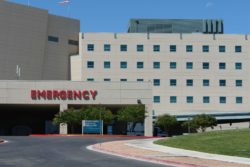 Healthcare ransomware attacks are becoming more and more common, so much so that it’s becoming something of a buzzword in the industry. Despite this, many may not know what exactly a hospital ransomware attack entails, and how to avoid them.
Healthcare ransomware attacks are becoming more and more common, so much so that it’s becoming something of a buzzword in the industry. Despite this, many may not know what exactly a hospital ransomware attack entails, and how to avoid them.
What is Ransomware?
Essentially, ransomware is a particular type of malware used to stop organizations from being able to access parts of their systems. For instance, in a hospital, users could be locked out from an important system like the electronic health record (EHR), and only allowed back in after they pay money—that is, a ransom.
According to the Department of Homeland Security, ransomware is spread through phishing emails or by visiting an unexpectedly infected website. Recovery from a hospital ransomware attack can be a long and arduous process.
Of course, like with any ransom agreement, paying the money demanded for the return of data access is not a guarantee that access will actually be restored. Those who would use ransomware in the first place aren’t necessarily going to be bound by their word to complete the exchange of money for restored access.
The Institute for Critical Infrastructure Technology (ICIT) has called 2016 the “year of ransomware,” but noted that it’s going to continue to get worse. Indeed, the ICIT said it expects ransomware to “wreak havoc” on the American infrastructure, Health IT Security reports.
“Ransomware is less about technological sophistication and more about exploitation of the human element,” said ICIT in its 2016 ransomware report. “Simply, it is a digit spin on a centuries old criminal tactic.”
Hospital Ransomware Attacks
A number of ransomware attacks have recently been targeted at hospitals, as well as schools and cities, according to a CBS News report.
So far, healthcare ransomware attacks have been reported at a number of facilities, including the following:
- DCH Regional Medical Center (Alabama)
- Northpoint Medical Center (Alabama)
- Fayette Medical Center (Alabama)
- Park DuValle Community Health Center (Kentucky)
- Campbell County Health (Wyoming)
In the case of these three Alabama hospitals, they actually had to turn patients away after they were affected in a hospital ransomware attack. While the hospitals still accepted new patients in critical condition, anyone in less than critical condition was not brought in.
“A criminal is limiting our ability to use our computer systems in exchange for an as-yet unknown payment,” said the DCH Health System, which includes these three Alabama hospitals, in a statement. “Our hospitals have implemented our emergency procedures to ensure safe and efficient operations in the event technology dependent on computers is not available.”
Hospitals have assured patients that the attacks did not affect or expose their medical information, but some remain skeptical of how safe that information is. Another issue with these attacks is that necessary patient care may end up being delayed, putting patients at risk.
The Impact of Ransomware Attacks
As more news has come out about specific ransomware attacks, studies have been launched to understand the possible impact on hospitals and patients. A study published at the end of 2019 reportedly shows that hospitals coping with the aftermath of a ransomware attack or data breach could expect to see a spike in fatalities from heart attacks.
According to Krebs on Security, this recent study was completed by Vanderbilt University’s Graduate School of Management, looking at over 3,000 hospitals. Of those, around 10 percent had suffered some sort of data breach or attack from ransomware.
The researchers reportedly found a connection between the occurrence of an attack and the time frame it took for patients who had a potential heart attack to get an electrocardiogram. In fact, the study discovered that it was an additional 2.7 minutes for hospitals with a recent data breach to give the electrocardiogram test.
This means that breach remediation was connected to patient outcomes and the timeliness of care. These vulnerabilities might lead hospitals to consider additional security protocols; however, it’s the patient who could suffer the consequences until those programs have been identified and implemented.
In addition to the impact on patients in the hospitals after the attack happens, those people who have their personal information exposed due to ransomware attacks could suffer from identity theft. This includes past patients who had their information stored at the hospital; many of these patients might not even know that their data was exposed until after an identity theft attack on their personal information happened.
If you were a patient at a hospital or other healthcare facility when a hospital ransomware attack affected your medical care, you may be able to join a class action lawsuit investigation.
This article is not legal advice. It is presented
for informational purposes only.
ATTORNEY ADVERTISING
Top Class Actions is a Proud Member of the American Bar Association
LEGAL INFORMATION IS NOT LEGAL ADVICE
Top Class Actions Legal Statement
©2008 – 2026 Top Class Actions® LLC
Various Trademarks held by their respective owners
This website is not intended for viewing or usage by European Union citizens.















5 thoughts onWere You Impacted by a Hospital Ransomware Attack?
add me
Add me
Add me please
Please add me
Please add me